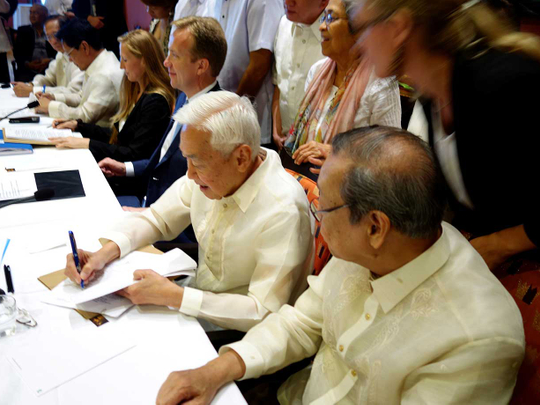
Manila: Negotiators of the Philippine government and communist rebels agreed to forge an “interim ceasefire” deal and for President Rodrigo Duterte to proclaim amnesty for more than 500 leftist political prisoners as a gesture of goodwill before the resumption of talks in Norway in October, sources said.
The Philippine government and the National Democratic Front (NDF), the negotiating arm of the 47-year-old Communist Party of the Philippines and its armed wing, the New People’s Army (CPP-NPA), committed to declare unilateral “interim ceasefires”, in a joint agreement signed on Friday after a five-day negotiation that began on Monday, the NDF said in its website.
Meanwhile, the NPA extended to August 31 its August 21-27 ceasefire against government soldiers in nine areas in Surigao del Sur and the whole province of Surigao del Norte, southern Philippines, to pave the release of five government soldiers, said the NDF. Details were not given.
The NDF has called for the release of 500 more political prisoners nationwide even after 20 arrested leftist leaders were allowed to post bail and participate in peace talks in Oslo.
Duterte has declared a unilateral ceasefire twice, on July 25 (which he lifted on July 30) and on August 20. Duterte also appointed two CPP-NPA allies to Cabinet posts in July before the resumption of peace talks.
The Philippine government and the NDF have appointed committee leaders who will complete comprehensive agreements on socioeconomic reforms (CASER), political and constitutional reforms (PCR), end of hostilities and disposition of forces (EOH-DOF), Secretary Jesus Dureza, head of the Office of the Presidential Adviser on Peace Process (OPAPP), said in Oslo, the transcript of which reached Manila.
“Both camps have decided to hold formal meetings again in the second week of October with different working committees tackling various issues related to proposed social, economic and political reforms,” said Dureza, adding the Philippine government and the NDF must sign the three proposed agreements before they can reach a final political settlement.
The negotiators also agreed in Oslo to respect initially signed agreements since peace talks began in 1992, and to reconstitute names of peace consultants with immunity from arrest — a provision of the Joint Agreement on Security and Immunity Guarantees (JASIG) that was signed in 1995, said Dureza.
“We are right on schedule. We expect a final peace agreement in six to 12 months,” said Labour Secretary Silvestre Bello, adding that Norwegian Foreign Minister Borge Brenden, a peace broker, attended the signing of the joint agreement.
The peace process broke down in 2001, when the US and the European Union placed the CPP-NPA on their respective terror lists; and in 2012, when the NDF refused the government’s demand for a ceasefire agreement and the government denied NDF’s demand for the release of more than 500 political prisoners.
The old left was established in 1930, legalised in 1937, merged with the Socialist Party of the Philippines in 1938, fought the Japanese Imperial Army during the Second World War, re-established for armed struggle by Jose Maria Sison in 1968, reached 25,000 in the 70s, weakened to 5,000 in the late 80s, but it has remained in control of red zones in far-flung villages. Asia’s longest-leftist running rebellion has killed 150,000 people nationwide.











